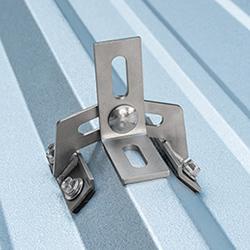UL To Bring New Science To PV Module Material Performance & Reliability
U.S. Department of Energy SunShot Initiative Awards UL with Research Funding on PV Module Backsheet Reliability
NORTHBROOK, Ill., Sept. 16, 2015 -- UL (Underwriters Laboratories), a global safety science organization, is proud to announce that the U.S. Department of Energy SunShot Initiative has awarded $1.35 million funding to UL to further develop new scientific methods for predicting PV module material performance and reliability over time. In partnership with several leading research companies and institutions, this project seeks to provide data on polymeric backsheets (part of the PV module) that correlates long-term field reliability with accelerated laboratory testing.
There have been many reports of PV modules with visibly degraded backsheet in early years of installation. This is due to the market pressures on keeping costs down while maintaining aggressive product development that are driving use of materials and combinations of materials with unproven durability characteristics, as well as reliance on current testing that does not factor in long-term durability in actual installed environmental conditions.
This SunShot Initiative Award will fund laboratory accelerated testing correlated to actual backsheet degradation in fielded PV modules. The results will benefit module manufacturers to optimize design strategies. Additionally, the results of this project will enable deeper understanding of the reliability of backsheets and will reduce the uncertainty of PV module reliability predictions, making it of great value to owners, operators and insurers of PV power plants.
"UL is pleased to gather a group of distinguished scientists to examine the performance expectations of PV materials that affects everyone from module manufacturers, and developers, to investors and insurers," states Lisa Salley, vice president and general manager for Energy & Power Technologies at UL.
The backsheet is a thin multilayer plastic sheet that covers the back of a module, protecting people from the high voltage and the other parts inside the panel from damaging ultraviolet light and the elements. Polymeric backsheets play a critical role in maintaining a PV module's performance over an extended outdoor lifetime, and they help ensure electrical insulation safety. The model developed from this study of aged field installed modules and laboratory tested PV modules will enable the industry to identify the key characteristics of backsheets that will significantly impact the future reliability and durability of modules installed in various climates. Manufacturers will benefit as they determine which materials to incorporate into their PV module designs and the industry will benefit from the significant reduction in uncertainty inherent in today's straight line degradation models.
Ken Boyce, principal engineer manager, Energy & Power Technologies at UL, states, "This project will examine the correlation between data in the laboratory and data that's collected from modules in the field. This will provide some missing links so that realistic models can be built to better predict lifetime performance."
UL will pursue this work with partners: 3M Company, Arkema Inc., Case Western Reserve University, the National Renewable Energy Laboratory (NREL), the National Institute of Standards and Technology (NIST), and Northeastern University.
UL intends to provide interval project reporting through white papers, webinars and speaking opportunities.
For more information, please visit UL's Booth #2942 at Solar Power International.
About UL
UL is a premier global independent safety science company that has championed progress for more than 120 years. Its nearly 11,000 professionals are guided by the UL mission to promote safe working and living environments for all people. UL uses research and standards to continually advance and meet ever-evolving safety needs. We partner with businesses, manufacturers, trade associations and international regulatory authorities to bring solutions to a more complex global supply chain. For more information about our certification, testing, inspection, advisory and education services, visit www.ul.com.
About the SunShot Initiative
The U.S. Department of Energy SunShot Initiative is a collaborative national effort that aggressively drives innovation to make solar energy fully cost-competitive with traditional energy sources before the end of the decade. Through SunShot, the Energy Department supports efforts by private companies, universities, and national laboratories to drive down the cost of solar electricity to $0.06 per kilowatt-hour. Learn more at www.energy.gov/sunshot.
Featured Product

